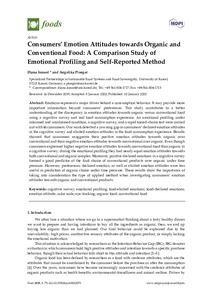Consumers’ Emotion Attitudes towards Organic and Conventional Food: A Comparison Study of Emotional Profiling and Self-Reported Method
| dc.date.accessioned | 2020-01-16T09:32:11Z | |
| dc.date.available | 2020-01-16T09:32:11Z | |
| dc.date.issued | 2020-01-10 | |
| dc.identifier | doi:10.17170/kobra-20200116930 | |
| dc.identifier.uri | http://hdl.handle.net/123456789/11424 | |
| dc.description.sponsorship | Gefördert durch den Publikationsfonds der Universität Kassel | |
| dc.language.iso | eng | |
| dc.rights | Urheberrechtlich geschützt | |
| dc.rights.uri | https://rightsstatements.org/page/InC/1.0/ | |
| dc.subject | cognitive survey | eng |
| dc.subject | emotional profiling | eng |
| dc.subject | food-elicited emotions | eng |
| dc.subject | food-declared emotions | eng |
| dc.subject | emotion attitude | eng |
| dc.subject | color scale | eng |
| dc.subject | eye-tracking | eng |
| dc.subject | organic food | eng |
| dc.subject | conventional food | eng |
| dc.subject.ddc | 630 | |
| dc.title | Consumers’ Emotion Attitudes towards Organic and Conventional Food: A Comparison Study of Emotional Profiling and Self-Reported Method | eng |
| dc.type | Aufsatz | |
| dcterms.abstract | Emotions represent a major driver behind a consumption behavior. It may provide more important information beyond consumers’ preferences. This study contributes to a better understanding of the discrepancy in emotion attitudes towards organic versus conventional food using a cognitive survey and real food consumption experience. An emotional profiling under informed and uninformed condition, a cognitive survey, and a rapid forced-choice test were carried out with 46 consumers. Our work detected a yawning gap in consumers’ declared emotion attitudes in the cognitive survey and elicited emotion attitudes in the food consumption experience. Results showed that consumers exaggerate their positive emotion attitudes towards organic over conventional and their negative emotion attitudes towards conventional over organic. Even though consumers expressed higher negative emotion attitudes towards conventional food than organic in a cognitive survey, during the emotional profiling they had nearly equal emotion attitudes towards both conventional and organic samples. Moreover, positive declared emotions in a cognitive survey formed a good predictor of the final choice of conventional products over organic under time pressure. However, preferences, declared emotion, as well as elicited emotion attitudes were less useful as predictors of organic choice under time pressure. These results show the importance of taking into consideration the type of applied method when investigating consumers’ emotion attitudes towards organic and conventional products. | eng |
| dcterms.accessRights | open access | |
| dcterms.creator | Ismael, Diana | |
| dcterms.creator | Ploeger, Angelika | |
| dc.relation.doi | doi:10.3390/foods9010079 | |
| dc.type.version | publishedVersion | |
| dcterms.source.identifier | ISSN 2304-8158 | |
| dcterms.source.issue | Issue 1 | |
| dcterms.source.journal | Foods | eng |
| dcterms.source.pageinfo | 79 | |
| dcterms.source.volume | Volume 9 |
Dateien zu dieser Ressource
Das Dokument erscheint in:
-
Artikel [1169]

